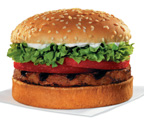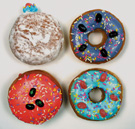
Have It Veggie Way
In a breakthrough for fast food restaurants, Burker King, Miami, has unveiled the BK Veggie nationwide. Flame-broiled and made of blended vegetables, grains and spices, the BK Veggie is the result of a collaboration between the fast food giant and Kellogg Company's Food Away From Home Division.This formulation was developed exclusively for Burger King, based on a specific flavor profile and ingredient base, as the Home of the Whopper sought to avoid the veto vote—the one non-meat-eater in a group that may sway it away from the fast food experience.
Look for more such development from this division of Kellogg, as a range of veggie burgers are available for foodservice, including hamburger style, veggie style, flavored veggie burgers and vegan burgers. Not that the company is solely focused on veggie burgers; Kellogg's Food Away From Home represents the company's efforts to expand all of its brands into the foodservice arena. Those famous brands include Kellogg's, Keebler, Pop-Tarts, Eggo, Nutri-Grain, Rice Krispies and Famous Amos.
Depressed? Try the Fish
Long touted as one of the more healthful forms of fat, omega-3 fatty acids (of the type found in salmon, swordfish and tuna) have been found to help relieve depression.Researchers studied 20 individuals with recurrent depression to determine the effect of a specific omega-3 fatty acid—E-EPA. Patients took their regular antidepressant medication and either a fish oil capsule or a sugar pill. After four weeks, six of 10 patients receiving E-EPA had significantly reduced symptoms of depression, according to lead author Boris Nemets, M.D. The study appears in the March issue of American Journal of Psychiatry.
“The effect of E-EPA was significant from week two of treatment,” as depressed mood, guilt feelings, worthlessness and insomnia improved. E-EPA may boost the antidepressant medication, or it may have antidepressant properties of its own.

To the Xtremo
Gatorade has joined the ranks of products exhibiting a special focus on the Latino market. The company's new Xtremo is described as a sub-line specifically formulated with an exotic blend of fruit flavors and a bilingual label for Latino consumers.“Gatorade with a Latin twist,” as the company calls it, can be found in select markets—specifically, grocery and convenience stores in markets with large Latino populations, supported by a range of new Spanish language ads. The three fruit flavors are mango, tropical and citrico, each formulated “to quench thirst and fuel working muscles,” says Gatorade.
The three-flavor line boosts Gatorade's total flavor arsenal to 22, including this year's new Ice varieties —a clear Gatorade with a burst of fresh fruit flavor. All 22 flavors boast the same 6% carbohydrate level and promise to replenish fluids and electrolytes, as well as carbohydrate energy.

Sweet Deal
Dunkin' Donuts has gotten in on the flavor-and-color phenomenon with a collaboration with Jelly Belly Candy Company. Tthe two have created three innovative donut flavors that take full advantage of Jelly Belly's jelly beans.Augmented by bright pink, blue and purple colors, the three donut flavors are available in seven different varieties, coated with a sweet, colorful frosting or filled with buttercreme or jelly filling, and sprinkled with various types of jelly beans. The donut flavors and varieties are: Cotton candy—baby blue frosting or buttercreme filling, and topped with cotton candy Jelly Belly jelly beans.
Watermelon and Munchkin—the taste of watermelon in a jelly-filled and frosted donut, also available as a Munchkin “for the little ones.”
Grape—lavender-colored creamy frosting or filled with buttercreme, adorned with grape jelly flavored jelly beans.